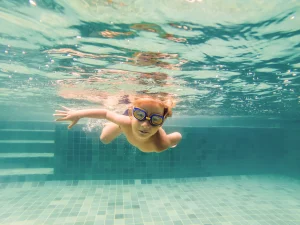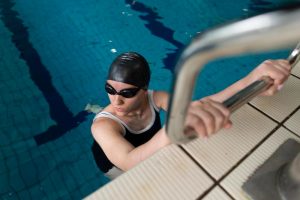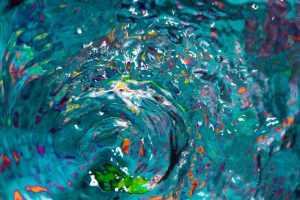Did you know that following nutritional tips for swimmers can increase your training performance and overall results?
Often, the difference between a productive session and a tiring one lies not just in technique or endurance, but in what you consume before and after swimming.
Whether you swim daily or are just starting out, adjusting your diet makes a significant difference. Certain nutrient groups preserve muscle mass, prevent injuries, provide energy, and enhance post-workout recovery.
Understanding which foods to consume, when, and how to structure meals can make nutrition your ally both in and out of the pool.
Why is it important to follow nutritional tips for swimmers?
Even those practicing swimming at home need energy, muscle readiness, and proper recovery. How we nourish our bodies is essential to maximizing gains with each training session.
According to British Swimming, nutrition, especially post-workout, is crucial to:
- Replenishing carbohydrates to restore muscle glycogen
- Promoting hypertrophy, muscle repair, and healing micro-injuries
- Rehydrating and restoring lost water and salts to strengthen the immune system
- Maintaining essential micronutrients such as iron and vitamin D to boost performance and prevent injuries
Other studies indicate that swimmers, especially young athletes in growth phases, may overlook nutrition. This can be extremely detrimental, limiting performance and potentially leading to Relative Energy Deficiency in Sport (RED-S) syndrome.
On the other hand, a personalised nutritional plan, focusing on adequate intake of carbohydrates, proteins, and fats, supports daily energy expenditure.

How to adapt your diet to improve performance in home swimming sessions
When discussing nutritional tips for swimmers, the aim is a balanced diet to make each stroke stronger, sessions less exhausting, and results better both in and out of the pool:
What to eat before swimming training?
This is one of the most valuable nutritional tips for swimmers. After all, the pre-training meal is what will ensure energy without digestive discomfort. Moreover, training on an empty stomach is not recommended.
Therefore, for larger meals consumed at least 2 hours beforehand, the focus should be on consuming low glycemic index carbohydrates and low-fat content that are easy to digest. Avoid fatty foods that can cause nausea, gas, and performance loss. Recommended options include:
- Complex carbohydrates for gradual energy release: oats, sweet potatoes, brown rice, and fruits;
- Small portions of lean protein: natural yogurt, grilled chicken breast, or boiled eggs.
- Hydration with water or coconut water.
For a pre-training snack, 30 to 60 minutes before swimming, opt for foods with a high glycemic index and low fiber content. For example: cereal bars and natural yogurt with banana and honey.
What to eat after swimming training?
Post-training is the ideal time to replenish nutrients and stimulate muscle growth. Consume a quick snack within 30 minutes after training, containing carbohydrates, proteins, and liquids.
For convenience, choose sandwiches, fruit smoothies, sports recovery drinks, cereals with milk or yogurt, and toast with scrambled eggs.
Physical activity requires nutrient replenishment with a complete meal within 4 hours post-training. Macronutrients should include:
- High biological value proteins: eggs, chicken, fish, tofu, and whey protein
- Combination of simple and complex carbohydrates: brown rice, baked potatoes, boiled cassava, whole wheat pasta, oats, granola, fruits, tapioca, etc.
- Anti-inflammatory foods: turmeric, ginger, berries, and nuts
For intense classes, a practical calculation is 1g of carbohydrate per kg of body weight and 16 to 25g of protein. Examples of meals include:
- Brown rice with grilled chicken breast and steamed vegetables
- Whole wheat pasta with lean meat or plant-based protein and raw salad
- Mashed sweet potatoes and whole wheat pancakes with ricotta and spinach
Extra Nutrition tips for swimmers
All meals should follow an individualised meal plan, focusing on lean protein and healthy fats. Maintaining a controlled caloric surplus and ensuring adequate intake of quality nutrients are essential for muscle gain and training consistency.
For those training swimming at home, nutrition is as crucial as discipline in training. It is your body’s greatest ally in water evolution. In this process, working with a nutritionist can make a significant difference in adjusting your diet according to training intensity, physiological needs, and individual goals.
Already following a balanced diet and aiming for even better results? Talk to Easy2Swim instructors for personalised lessons aligned with your objectives.






